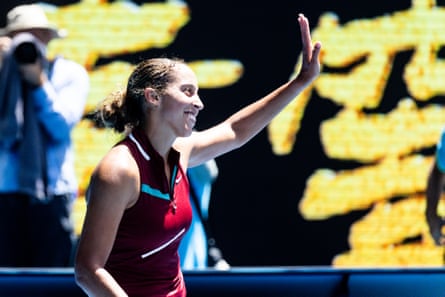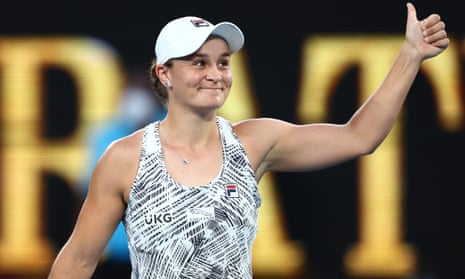Ash Barty’s rapid march through the draw continued on Tuesday as she faced her highest ranked opponent so far, the in-form 21st seed, Jessica Pegula, and treated her with the same disdain as all others who have crossed her path here this year. Barty allowed Pegula two games as she reached her second Australian Open semi-final with a 6-2, 6-0 win.
“I’m just having fun,” said Barty. “I’m having fun trying to problem solve out on the court. Each and every opponent has been different, each and every opponent has presented me with a different challenge and forced me to use another tool in my toolbox.”
A measure of Barty’s efficiency this year: the 63 minutes spent on court against Pegula is her second-longest. She has dropped 17 games in her five matches, dismantling opponents with clarity and ease.
Pegula is the daughter of Terry Pegula, a billionaire businessman who owns the NFL’s Buffalo Bills and the NHL’s Buffalo Sabres. She is a late bloomer at 27, having spent most of her career on the ITF Circuit outside the top 100.
She did not break through until last year, a season that began with a quarter-final here and ended with a top 20 debut.
She has gained notable success by striking an extremely flat ball, taking the ball early and robbing time from opponents with her consistent depth.
Barty did not start well, spraying unforced errors in a number of long games early on. But she soon got to work, moving Pegula from side-to-side with her forehand and dragging her into the forecourt with her backhand slice.
“You feel pretty helpless,” said Pegula. “When she gets into a rhythm, she can run away where she really starts, her game just picks you apart a little bit. It can be really frustrating because you don’t feel like you can get a lot of free points, there’s not much you can do.”
Barty arrived here in some of the best form of her life, playing with freedom and joy. This tournament has also provided a reminder that Barty, who stands at 5ft 5in, is arguably the best server among short players in recent memory.
After five matches, she has struck 50% unreturned first serves and 28% on her second. She has won 97% of her service games in the tournament, losing just one in her tough fourth-round match against Amanda Anisimova.
“She just does everything a little bit better than everybody,” said Pegula, smiling. “Just for women’s tennis as well, she plays more like a guy, maybe a different kind of style that we’re not used to playing day in and day out.”
Pegula named Barty’s serve and her defence as her most difficult attributes and noted the value of her being able to serve so well despite her height. “She’s definitely living in everyone’s head a little bit. I don’t think anyone is going to feel great going out to play her because they know they have to play really well.”
Barty will face Madison Keys, who moved into her second Australian Open semi-final by following up her destruction of Paula Badosa, the world No 6, with a second consecutive victory over a top-10 opponent. She defeated the French Open champion, Barbora Krejcikova, 6-3, 6-2.

Keys said: “I think I’m going to cry. It means a lot. Last year was really hard. I did everything I could with my team to really reset this off-season.
“I’m really proud of myself and so thankful to my team and my friends and my family for helping me through what was a really tough year.”
It is Keys’s first grand slam semi-final since the US Open in 2018, with her best run taking her to the final in New York the previous year, losing to Sloane Stephens. Keys has played in five grand slam semi-finals, one more than Barty, and first contested a major semi-final at the 2015 Australian Open.
She said of her previous semi-finals: “You take the experience out of it. I know I’m going to feel nervous. I know I’m going to be excited. I know all of those feelings are going to be there. But it’s also a completely different situation, time and person, all of that.
“I honestly feel pretty neutral. I have gone into every match thinking I can absolutely win any match that I’m out on the court. I will say it’s been nice to be the underdog for the first time in a long time.”

Comments (…)
Sign in or create your Guardian account to join the discussion